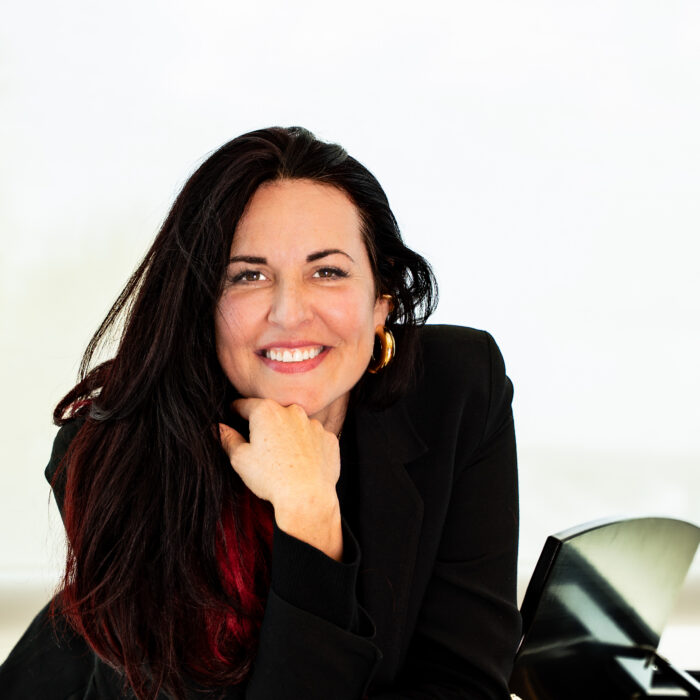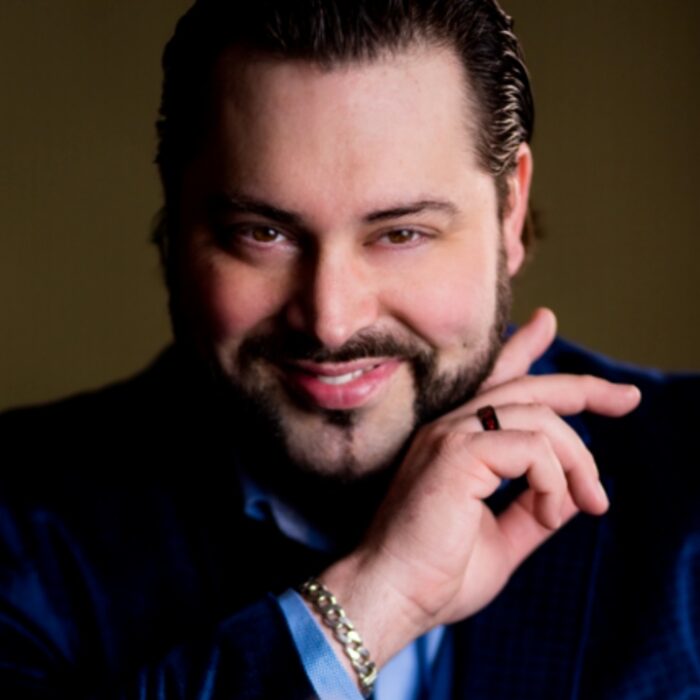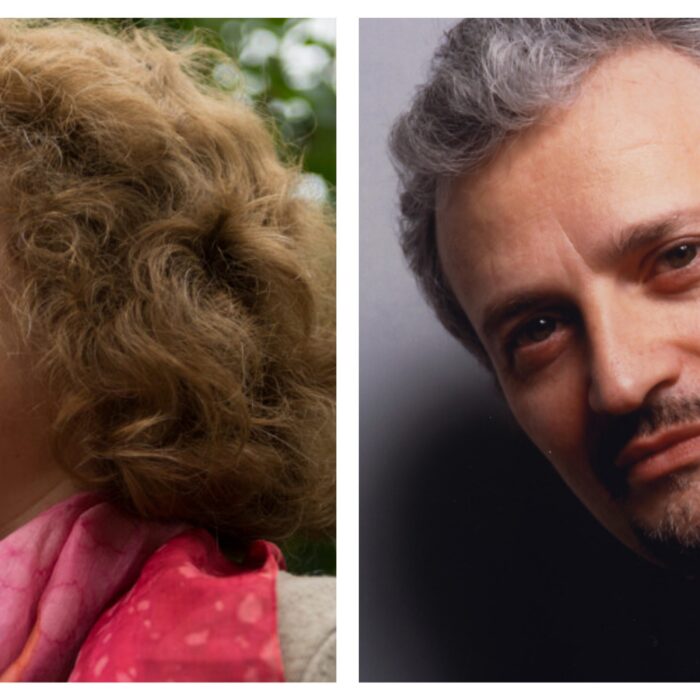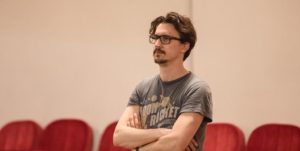
Q & A: Director Damiano Michieletto on Searching For Truth, Wagner, Janácek, & Putting Drugs into ‘L’Elisir D’Amore’
By Mauricio Villa(Credit: Yasuko Kageyama)
Damiano Michieletto is one of the most sought after directors today. Born in Venice, he graduated in modern literature at the Venice University and then went on to study theatre and opera production at the Paolo Grassi School of Dramatic Art in Milan.
Success would follow him soon after when he debuted in 2003 at the Wexford Festival with Jaromír Weinberger’s “Švanda the Bagpiper,” winning an Irish Times / ESB Theatre Award.
From there he continued to grow in his reputation, conquering the Rossini Opera Festival with “La Gazza Ladra” and receiving the 2008 Abbiati Award. He would remain a fixture with the festival, returning in subsequent seasons to director “La Scala di Seta,” “Sigismondo,” and “La Donna del Lago.”
Since then, his productions have gone mainstream with the director making a splash at the Salzburg Festival with “La Bohème” in 2012 and returning in 2013 with “Falstaff.” He directed a new production of “Guillaume Tell” at the Royal Opera House in London in 2015, returning with “Pagliacci” and “Cavalleria Rusticana” in 2016; he earned an Olivier Award for the latter production.
Those are but a handful of his major successes to date with the director making headlines in Paris, Amsterdam, Venice and multiple opera houses around Europe.
With his production of “Cavalleria Rusticana” and “Pagliacci” set to appear in Barcelona, Opera Wire recently had the opportunity to speak with Michieletto about his work and how he approaches opera.
OperaWire: How do you work? Where does your inspiration come from? The libretto, the score, several sources…? How much do you have decided from previous work and how much comes from the rehearsal room?
Damiano Michieletto: What is opera? It is the combination of words and music. Therefore you must be inspired by reading the libretto and listening to the music. These two things develop your imagination. I would say I am a narrative director. I liked the story telling, so I put a strong attention to the words and I try to give the singers precise reasons to say this words, like working with actors in a play. But then you have the music which gives you the atmosphere, the same words with different music leads you to another point.
You cannot divide them. You have to work with two things together.
OW: How much do you have decided from previous work and how much comes from the rehearsal room?
DM: If you do a play with actors, you don’t have to decide many things in advance and usually the set is very simple. Whereas if you do an opera and you have to present a project one year in advance, you have to fix and decide many things.
But I try to not decide too many things. I do have some kind of frame to begin with and then I like to rehearse with singers and try to get the best things out of them. I know the direction of the production but then I love to be surprised. I induce the singers to improvise, to propose and to be creative. It’s not about just me giving instructions because this would not only boring for me but for the audience too.
People working with me, my team, do sometimes complain and became crazy because I change too many things, but I try to work with the people that I have.
I don’t think you’re a good director if you consider that you know everything. A good director is one that faces the fact that you begin the rehearsals without all the solutions, and then during rehearsals you discover the right answer which belongs to this specific singer, at this specific moment.
OW: You always bring your productions closer to our era. Is this a way to make opera more accessible to a wider audience?
DM: I think it is more about my own fantasy. If you ask every director they would say that of course they want the opera to connect with the audience, but there are many ways to do that. You can use traditional costumes and sets, a modern language, abstract conception. There is not a single valid way and every director presents their personality in their own work.
And for me, when I think about a new story, I try to think about the life I know, things that I have seen and experienced and I try to bring my imagination to the story, so there are usually contemporary references. The stories that operas tell are universal, classic and epic. They speak about things that everybody will sooner or later face. That is why you can understand it.
OW: Action is a trademark in your productions. In your “Elisir d’Amore” we see the singers jumping, rolling in the sand, doing aerobics, showering while singing, climbing the inflatable wedding cake, bathing in foam. Is it easy for you to work with singers and obtain such demanding actions?
DM: Well, I actually never force anyone to do anything, I just propose. But I explain very carefully that the performers have to go to extreme situations in order to get a strong reaction from the audience. It is the same with the voice. The singers go to the extreme of their vocal ranges from very low notes, to the highest, or they have to sustain long notes that really take out your soul. Or you have a concertanto with seven or eight or, even in Rossini, 14 people singing together. So being extreme is the core of opera.
But as I said it is not me pushing to get something but deeply going to what the story is demanding. Just consider that operas the squeeze a lot of things into a two hours show: love, hate, revenge, murder, suicide. So, when you face a comic opera, you have to enjoy it and to be bold. Opera is not shy people. You have to be a brave performer. It is funny because actually when singers are doing something extreme, they enjoy it. And that means I am going in the right direction, because I need to make them understand why they are doing this actions. I need them to understand that they are doing them for themselves, not for Damiano. At the end of the day, they are the ones on the stage.
OW: Do you have a specific method of directing or it depends on the singers you work with?
DM: It depends. I have not arrived yet at a certain point where you have find your own truth. I have many steps to take as a director, to create a language that goes deeper, so I feel that I am in constant research. I am always trying, but I really don’t have an answer for this.
I also try to be open, and not come with a fixed idea. I am here working face to face with a specific singer, and I need to understand what is happening and what is necessary now. I try to listen, and then to propose something and just look. I think the work of the director is to be the first spectator of the show, and it is important to stay very humble. For example, I don’t understand directors who shout and I can tell you that the few moments that I have shouted were moments where I was in trouble, I was under pressure, or I had no clear idea. I was not prepared and I focused all this pressure and frustration onto the singers. That is why, I think it is important to listen, not to shout.
OW: You debuted with the unknown Weinberger’s “Švanda the Bagpiper” at the 2003 Wexford Festival, and then became associated with the Rossini Opera Festival, where you staged several of his operas. Since then, you have done a lot of Bel Canto operas. Do you see yourself as a Bel-Canto specialist? What attract you to Bel Canto operas?
DM: At the beginning I was very connected with Rossini, especially because my implication with the Rossini Opera Festival. What I like about this repertoire is the rhythm of the story. I consider that the genius of Rossini is his ability to keep the beat.
OW: Do you feel more comfortable directing comedies over dramas?
DM: I have no preference. What I like about comedies is that at the end of a day rehearsing I feel cheered up and happy and my spirit is light. Sometimes when I rehearse a drama and you go deep into it, you bring part of that into yourself and somehow I need to be released from all these powerful dark emotions and tension. In drama you have to be honest when facing the conflict and with comedies needs you to be super precise and clever. It is a different approach. I feel I am in the middle and I like to work in both genders.
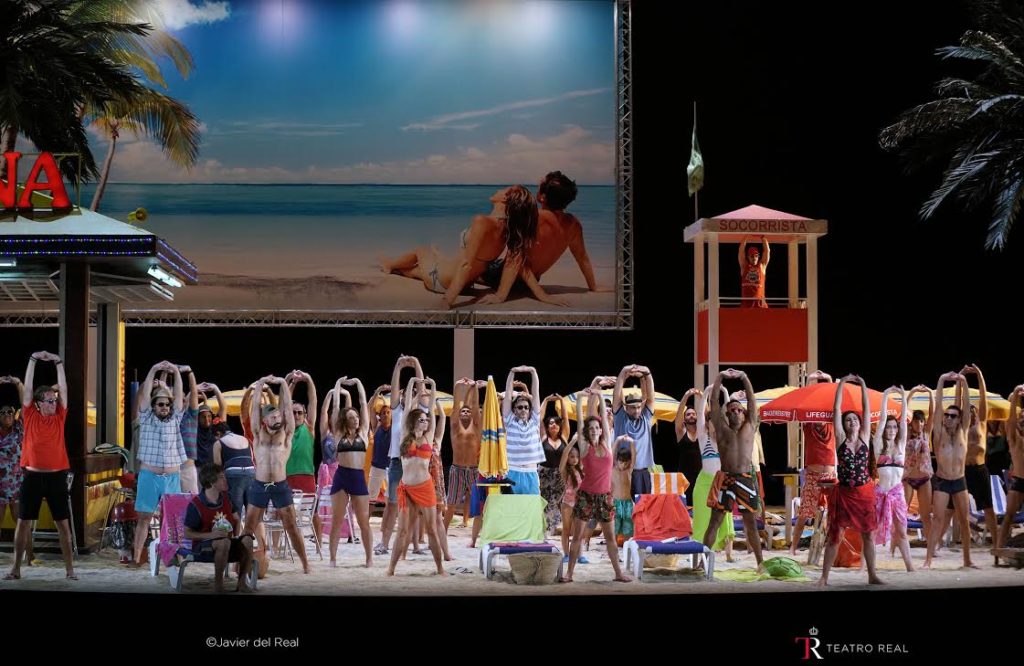
OW: One of your most notable productions is of “L’Elisir d’Amore” which you set on a Spanish Mediterranean Beach. How did this decision come about?
DM: This production premiered at “Les Arts” in Valencia and I wanted to connect the story to the place we were performing it. But it is more about a Mediterranean ambience: the sun, the beach. The story begins with a group of people resting after a hard day of work, and enjoying the fresh water: “tempran l’ombre e il rio corrente” and this was my starting point.
Then I started considering Belcore as a sailor, because of the myth of the Latin lover that he comes, find a woman and runs off. In the opera Belcore has one day and then he must leave again, so I thought being a sailor would justify this rush.
So starting with those two points, we built the idea of the beach, which I think fits very well with the story. And even today many years after its premiere, the production seems really fresh and simple, because it does not take the story and force it into another way. I think it respects the core of the story. That’s why it’s very understandable and enjoyable.
OW: One unique factor of this production is that you have done away with a static chorus in this production. We see them play “mus” (a typical Spanish card game), playing with rackets, dancing the conga, bathing in foam. How do you create such organized chaos with the chorus, extras, and soloists? Is it easy to make the chorus interact or do physical actions while they are singing?
DM: I think the chorus is really underestimated. Some directors find it a hard job to work with chorus, so they just give up and say: “Ok, just stay there and sing.” Other directors are just scared because you have around 60 people to work on your own. That frustrates the members of the chorus because they have to stay still on the stage and are not part of the action.
But to me it is just the opposite. I consider that the chorus have a strong presence on stage and it is a pity not to get them involved in the action. I try to be direct clearly when I work with the chorus, give them directions and treating them as individuals.
OW: We see Dulcamara smoking dope, snorting coke, and, at the end, you have Belcore arrested for possession. Why introduce drugs into this opera?
DM: Dulcamara is a complex character. He is not a nice person. He is someone who makes money off of people and who treats them very badly. So, I try to show these two faces: the advertiser of this Energy drink which is the Elisir and then this dark side of him that comes later.
What he really does is corrupt Nemorino. Even if you keep the story following the traditional way, in the second act Nemorino wants more Elisir, which I found to be a metaphor of the addiction and the effect of drugs. With this Elisir you feel strong, powerful, different, self-confident, which is the same effect caused by some drugs. And Nemorino wants more but he has no money, so he turns himself into a soldier, losing his freedom, and Dulcamara just don’t care. I
t is Adina who stops all of this, realizing that Nemorino is losing everything for her and that is her turning point. At the beginning, we have seen Adina being very cruel to Nemorino, flirting with Belcore and laughing at him. But that is the reason for her change – she becomes conscious of the suffering of Nemorino.
There is also the duet between Adina and Dulcamara, where he tries to take advantage of her and sell her L’Elisir, telling her that she also needs also this drug. But she refuses, saying that she just needs herself.
OW: Lighting is always very specific in establishing mood in your productions. How important is lighting to you?
DM: I believe that lights have become more important than the sets. When you start rehearsing a production with no lights it looks naked. Then you have all these people saying to be truthful to the story and the libretto, but at the end you are in a different theatre. In the past you have candles for lighting, and everything was bare. But right now, we have electricity, video, projections, so technology completely changed the aesthetic. I do not use lights just to illuminate the sets and singers. Lights become a part of the story telling.
O.W: You are constantly revisiting your productions and making changes and improvements. Is this because you are not satisfied with the result, or a way to keep always improving your productions?
DM: When I change things, it is because I am not satisfied and I did not find the final solution. Also, because of curiosity, to try to understand and keep researching, looking for the best way. When you have doubts, I think it is a good thing to keep questioning the story, it is also a way to declare that you don’t have the correct answer, the truth.
Anyway, I don’t have always the possibility to do that because you just have no time to follow all your revivals, but I try to keep a close contact with my assistant, to know how the cast is responding.
People pay expensive tickets to see opera, so they deserve strong quality. It is the same production, but you have paid a new ticket and you deserve to get something fresh; it is the same as when you go to a nice restaurant. You pay and you deserve good service. I think that is my responsibility.
O.W: Is there any specific opera you would like to direct that you have not done yet?
DM: In the next few years I have a couple of Janácek operas that I am really looking forward to. I have this kind of fixed idea in my mind that it is important to produce new operas. It is sad for me to think that opera has no future. And we have big examples of composers from the last century which were able to write operas that have become part of the repertoire. Janácek is one of them. He wrote in his own language, telling stories from his country and not following any strict rules or schools of composition. This is proof that it is possible to write new and great operas.
The moment you think you are part of a school it is “game over.” You have to break this label and bring new and unexpected things. And theaters always produce the same operas all over the world. We have to make a step forward and I strongly believe that opera has a great future.
OW: Would you like to direct Wagner’s Ring Cycle at some point?
DM: It is under discussion at the moment, so we’ll see if it happens. It is like life itself. When you have to reach the top of the mountain you have to start step by step, and I am very curious to see what comes out of that and which kind of world we will create with stories that have nothing to do with the kind of repertoire that I have done, especially with this kind of composition with long monologues and scenes with little action.
But you have to create conflict, to create life. This happened when I did “Alcina,” which was a new repertoire to me and you have this long succession of aria after aria, which are usually seven minutes long with only three sentences. It was a hard process, rehearsing with the singers on how to develop this character, turn the conflicts into theatrical situations. I remember that at the end of those rehearsals I was very tired, it took a lot of energy.
I think with Wagner would be the same but with another proportion because you have all those mythical stories, and again these long moments when you have to keep the development of the story.
